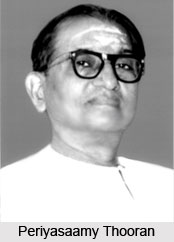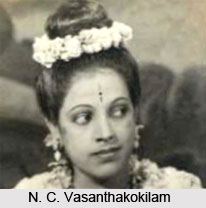 Periyasaami Thooran was born on 26th September in the year 1908. He was a patriot, teacher, Tamil poet and a popular composer of Carnatic music.
Periyasaami Thooran was born on 26th September in the year 1908. He was a patriot, teacher, Tamil poet and a popular composer of Carnatic music.
Early Life of Periyasaami Thooran
Periyasaami Thooran was born on 26th September 1908, to K.A. Palanivelappa Gounder and Paavaathal at Manjakattuvalasu near Modakurichi in the Erode district in the Indian state of Tamil Nadu. Periyasaami was highly motivated and influenced by Mahatma Gandhi and Mahakavi Subramania Bharathiyar.
While he was still a student in college he published an underground monthly magazine called `Pithan` which was printed by his contemporary K.M. Ramasami gounder in Gobichettipalayam in the beginning and also wrote poems and short stories. It was actually at this time that he began writing under the pen name called `Thooran` as `Pithan` featured anti British occupation literature. He declined to sit for the final Bachelor of Arts examination shocked by the execution by the British of Bhagat Singh. Thooran gained his Bachelor of Arts (Mathematics with a Minor in Astronomy) and L.T. (Licentiate in Teaching) later. Thooran`s background in Science was to later help him complete the Tamil Encyclopaedia project as he was thoroughly convinced that Science and Technology was an integral part of language.
Literary Career of Periyasaami Thooran
Periyasaami Thooran was a prolific writer and he composed over six hundred songs on national, spiritual and moral issues. He also wrote `a poem a day` for several years after his daily poojas. He also became famous and the melody queens N. C. Vasanthakokilam and D. K. Pattammal always included his works in their concerts.
Periyasaami Thooran, a man with noble ideas, is an acknowledged poet and composer. Analogous to the Tyagaraja`s `Santhamulekha, Soukyamuledhu` (set to Sama ragam), Thooran`s `Santhamillamal sukham undo` (Nattaikurinji) stresses that there is no joy without patience and no contentment amidst worries. Deep philosophical truths lay hidden in his simple devotional songs. Musical aesthetics and Bhava find abundant evidence in his compositions.
While he was not a musician, he had profound poetic talents. Like Arunachala Kavirayar, he had to seek outside help to set his lyrics to music. Sivaramakrishna Iyer (who was born in 1913 in Mavelikara, Kerala and had joined Sri Ramakrishna Vidyalaya as music teacher in 1937) was his guru and choreographer. Thooran also availed of the services of senior musicians like K. V. Narayanaswamy, T.K. Govinda Rao and T. V. Sankaranarayanan.
Tiger Varadachariar, Musiri Subramania Iyer and Semmangudi Srinivasa Iyer are three of the eminent musicians who have spoken highly of his compositions. His popular compositions include Gananaathane (Saranga), Kaliyuga Varadhan (Brindavana Saranga), Muralidhara Gopala (Maand), Muruga Muruga (Saveri), Pazhani Nindra (Kapi), Punniyam Oru (Keeravani) and Thaye Thripurasundhari (Shuddha Saveri).
Contributions to Tamil literature

His songs were published in five volumes entitled `Isai Mani Manjari`. Other publications include `Thooran Stories` (1962), `Nalla Nalla Paattu` (1965), `Call of the Wild` and `Bharati` for children, some of which were purchased by Tamil Isai Sangam.
He was Chief Editor from 1948 to 1978 of the Tamil Encyclopaedia which ran to ten volumes. The credit for bringing out the first-ever Children`s Encyclopaedia in Tamil in ten volumes goes to him.
Works of Periyasaami Thooran
Poetry
Ilanthamizha
Minnal Poo
Nilap Pinju
Patti Paravaigal
Short Story Collections
Thanga Changili
Pillai Varam
Maavilakku
Kaalingarayan Kodai
Urimaip Penn
Thooran Ezhuthoviyangal
Essays
Thein Chittu
Poovin Sirippu
Kaattu Vazhithanile
Plays
Azhagu Mayakkam
Ponniyin Thyagam
Choozhchi
Ilan Thuravi
Aadhi Aththi
Manak Kugai
Kaadhalum Kadamaiyum
Books on Psychology
Kuzanthai Ullam
Kuzanthai Manamum Athan Malarchiyum
Thazhvu Manappanmai
Adi Manam
Manamum Adhan Villakamum
Kumara Paruvam
Book on Embryology
Karuvil Valarum Kuzhandhai
Books on genetics
Paarambariyam
Petror Kodutha Perung Kodai
Books for Children
Songs
Aanaiyum Poonaiyum
Nalla Nalla Pattu
Mazhalai Amudham
Animal and other stories
Natya Rani
Jimmy
Nila Paatti
Olai Kili
Thambiyin Thiramai
Kadakkitti Mudakkitti
Manjal Muttai
Other stories
Maaya Kallan
Soorap Puli
Kollimalai Kullan
Sangagiri Kottaiyin Marmam
Tharangambody Thangappudhaiyal
Science
Parakkum Manidhan
Musical Compositions with Swara notations
Two Volumes published through Annamalai University containing 150 songs
Isai Mani Malai
Isai Mani Manjari
Murugan Arul Mani Maalai
Keerthanai Amudham
Folk Songs
Katril Vandha Kavithai
Translations from English to Tamil
Kanagathin Kural (Jack London`s Call of the Wild)
Kadal Kadandha Natppu (Naomi Mitchison`s Judy and Lakshmi)
Paravaigalaip Par (Jamal Aara`s Watching Binds)
Editions
Bharathi Tamizh
Thakurin Aimperum Katturaigal
Published from palm-leaf manuscripts
Poet Kalamega`s Chithira Madal, with anotations and explanatory notes
Vadivel Pillai`s Mohini Vilasam
Avinashi Navalan`s Thingalur Nonndi Nadakam
Books on Bharathi
Bharathi Noolagal Oru Thiranaivu
Bharathiyarin Nagaichuvaiyum,Naiyaandiyum.
Bharathiyum Ulagamum
Bharathiyum Kadavulum
Bharathiyum Samoogamum
Bharathiyum Thamizhagamum
Bharathiyum Paattum
Bharathiyum Paapaavum
Bharathiyum Pennmaiyum
Bharathiyum Bharatha Desamum
Compilation of Tamil Encyclopedia
General Encyclopaedia, 10 Volumes
Children`s Encyclopaedia, 10 Volumes
Honours and Titles
Padma Bhushan by President of India 1968
Isai Perarignar by Tamil Isai Sangam 1972
Kalaimamani by Tamil Nadu Iyal Isai Nataka Mandram 1970
Annamalai Chettiar Award by MAC Charities 1978




















